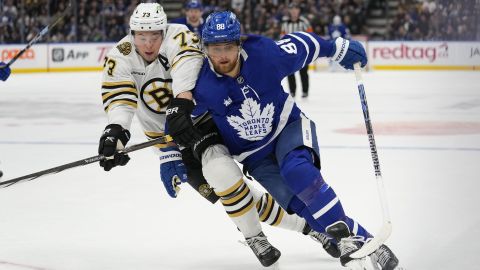So the NHL held its ground and axed Ilya Kovalchuk‘s deal with the New Jersey Devils. The league went out and said what everybody was already thinking: The Devils were laughing in the face of the NHL salary cap.
Apparently, only Kovalchuk felt like he would still be playing hockey at the ripe age of 44. You got the feeling that even Devils general manager Lou Lamoriello knew exactly what he was doing circumventing the system he helped create after the lockout.
The problem was that the NHL knew what he was up to as well, and unfortunately for the Devils, they may be the example the league will point to in regards to what GMs shouldn’t do.
Yes, Kovalchuk’s 17-year deal was the longest in NHL history, but it was far from being the first long contract. Rick DiPietro got himself a 15-year stay on Long Island, though not necessarily on the ice. Roberto Luongo is set to be the netminder in Vancouver until he’s 43.
And that’s just the goalies.
Henrik Zetterberg is in Hockeytown for 12 years. He’ll earn $67.65 million in the first nine seasons until he takes a massive cut to $5.35 million in the last three.
Alexander Ovechkin will be in the nation’s capital long enough to see at most four different presidents.
There’s also a center that goes by the name of Marc Savard. You may have heard of him. He’ll be earning $28 million in Boston for the rest of his career, yet the Bruins’ cap hit only equals an extremely manageable $4 million.
Up until Tuesday, all the NHL could do was grumble and rubber-stamp the increasingly ridiculous-looking deals because, in all honesty, it’s hard to prove beyond a reasonable doubt that both sides negotiated the deals knowing full well they may not carry them out fully.
“We are extremely disappointed that the NHL has decided to reject the contract of Ilya Kovalchuk,” Lamoriello said in a statement after the deal was rejected. “The contract complies with the terms of the collective bargaining agreement. We will have no further comment until the process outlined in the CBA is complete.”
And Lamoriello is right.
According to the CBA he did nothing wrong, and that’s the problem. It is a question that will linger long after Kovalchuk pots his first goal wherever that may be, and it will ripple throughout the league — especially down on Causeway Street, where the Bruins face two big questions come next offseason.
They are Patrice Bergeron and Zdeno Chara. Chara and Bergeron are both entering the final year of their respective contracts. Bergeron will make $4.75 million, while Chara will make $7.5 million, and both are considered the core of the team, with Chara as the current captain.
Chara is among the league’s elite defenseman. He’s arguably in the top 10 and has been the go-to shutdown defenseman for the B’s. Take Chara out of the lineup, and it would be hard to imagine the Bruins still being among the league leaders in goals against. In other words, the Bruins’ chances of success depend on Chara, meaning it will be imperative to keep him in black and gold.
Bergeron was a sensation after the Bruins drafted him in the second round in the 2003 draft. There was a scare when he suffered a Grade 3 concussion that limited him to only 10 games in the 2007-08 season. His production dipped in the immediate season after the concussion, but he went on to score a team-leading 52 points last year.
Now entering his third season since his concussion, Bergeron will be 25 on July 24 and entering the prime of his career. He has future captaincy written all over him, so the Bruins will want to be keep the center in the fold as well.
In the wake of the Kovalchuk rejection, long-term contracts in the NHL will be viewed differently. It’s too early to tell whether the rejection was a check against what many already were calling a ridiculous contract or whether it was a sign of things to come, but it’s guaranteed the loophole will be closed in the next round of CBA talks.
It will have a definite effect on how Chara and Bergeron’s future deals will be negotiated, and also may mean changes for other players or teams.
That can mean a lot of things for the Bruins, but the message has been made clear. Peter Chiarelli and GMs across the league will have to tread a little more lightly when it comes to locking up the faces of their franchises.



